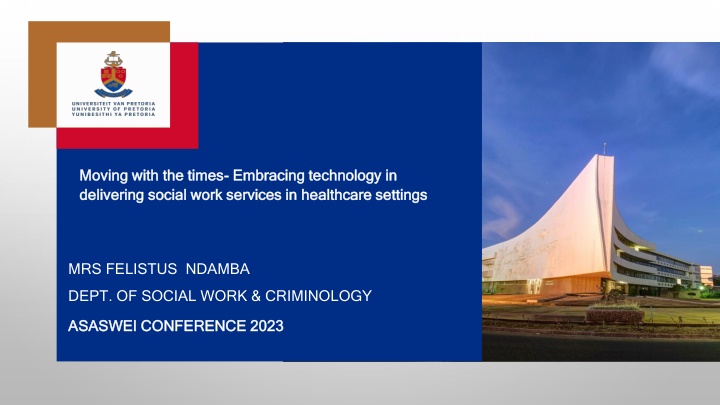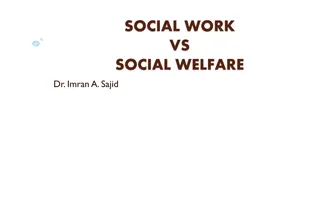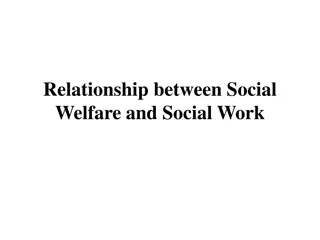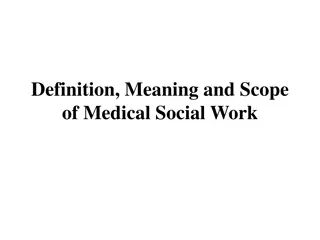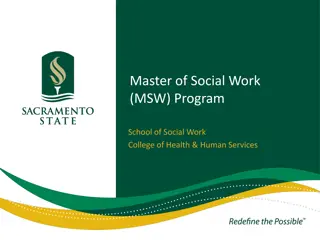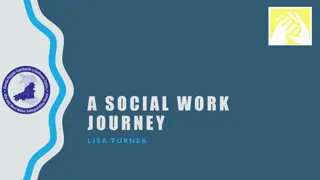Embracing Technology in Delivering Social Work Services
This presentation focuses on the impact of caregiving on cancer patients and provides recommendations for embracing technology in delivering social work services in healthcare settings. It discusses the tasks of caregivers and the role of social workers in healthcare, emphasizing the need for holistic care and support for patients and their families. The research methodology includes qualitative approaches to understand the experiences of caregivers and social workers working in healthcare settings.
Download Presentation

Please find below an Image/Link to download the presentation.
The content on the website is provided AS IS for your information and personal use only. It may not be sold, licensed, or shared on other websites without obtaining consent from the author.If you encounter any issues during the download, it is possible that the publisher has removed the file from their server.
You are allowed to download the files provided on this website for personal or commercial use, subject to the condition that they are used lawfully. All files are the property of their respective owners.
The content on the website is provided AS IS for your information and personal use only. It may not be sold, licensed, or shared on other websites without obtaining consent from the author.
E N D
Presentation Transcript
Moving with the times Moving with the times- - Embracing technology in Embracing technology in delivering social work services in healthcare settings delivering social work services in healthcare settings MRS FELISTUS NDAMBA DEPT. OF SOCIAL WORK & CRIMINOLOGY ASASWEI CONFERENCE 2023 ASASWEI CONFERENCE 2023
OVERVIEW o Presentation focus o Caregivers and their task o Social workers in healthcare o Research approach o Findings o Conclusions o Recommendations F Ndamba 2
Presentation focus The presentation discusses the impact of caregiving on caregivers of cancer patients, social work services and provides recommendations thereof which encourages embracing technology in rendering social work services in healthcare settings.
Caregivers and their tasks - Blood relatives, partners, friends, neighbours and extended support community Tasks: Tasks: o Primary source of support- physical, emotional and psychological o Practical care of the patient (Revenson, Griva, Luszczynska, Morrison, Panagopoulou, Vilchinsky & Hagedoorn, 2016:5) o Day to day basic activities o Medically skilled caregiving tasks (Adelman, Tmanova, Delgado, Dion & Lachs, 2014:1053; Glauber & Day, 2018:538) o Little information and insufficient preparation o Stressful to care for a cancer patient.
Social work services - Strategically positioned to work in healthcare settings- hospitals, hospices etc - Social workers are essential in the delivery and design of optimal health care (Browne, 2012:24). Seen as ports of entry for patients and families in healthcare- meeting their social, economic, psychological and emotional needs. - - Ensure that the patient and his/her family receive the best care and support as possible. - social workers have invaluable contribution to make towards the provision of holistic care and support to cancer patients and their families (Peres, 2016:189). - Social work intervention is offered to help families to adjust to and cope with the demands of the illness as well as assisting families to navigate the health care system (Rolland, 2012:318) - Advocacy role- MDT
Research methodology o Qualitative approach o Designs- phenomenological, exploratory, descriptive and contextual o Population- caregivers residing in Gauteng proving and social workers working in healthcare settings o Sampling methods- purposive and snowball o Face to face interview- interview schedule o Data analysis- Tesch s stepwise plan CL CAR BONATTO 6
Findings on the impact of caregiving Physical strain and fatigue- caring is often intense, hard, laborious and exhausting Physically itself it s draining because l have a problem with my hip, shoulder and knee, because l will be cleaning and lifting him up. I don t tell him Physically I am good but l get tired but l have refused to take energy booster because of my age. I would rather do what is of my limitations Psychological and mental strain Psychological and mental strain- - leads to distress, anxiety, depression, somatic complaints, worry, loneliness, anger, feelings of helplessness I am going to use the word daunting, it s daunting. It very time consuming and it s an alone moment. The fact you don t know what to do you feel unsure because you don t know if you are doing enough . when my husband is not feeling well, i get scared and thinks my husband will go to the hospital, so it s very stressful and it saddens me. I am scared i might lose him.
Findings on the impact of caregiving.. Social isolation Social isolation- restricted leisure activities and time for family limited social and family support. No l am not going to those places anymore, l can t leave him like this, so whenever l plan to visit l go with him. yeah, we go together to church. Self Self- -neglect neglect- - caregivers often neglect the importance of self-care. he is important and l think that s how l even neglect my healthy because my first priority is him. Conflictual Conflictual family supporting them It s frustrating, feels like am alone because my family was not in the picture to provide support, people were just expecting me to take on all the responsibilities, because she is my mother, it became difficult family relationships relationships caregivers become angry and frustrated at family members for not before l was feeling angry because there was no one there for us, we were all alone and was thinking of taking her to old age home
Findings on social work services Counselling and emotional support Counselling and emotional support using telephonic calls and house visits They [social workers] check both of us the family. They also ask me questions, how am I coping, how am I doing with mama, how is she . Explaining the condition to patients and family in simple language Explaining the condition to patients and family in simple language Psychoeducation Psychoeducation Yes, psychosocial education in terms of how to take care of the patient, making sure the patient takes the medication as required and in terms of understanding the stage of cancer. Linking caregivers with available resources Linking caregivers with available resources- - SASSA, DSD, DHA
Findings on social work services cont Discharge planning and follow Discharge planning and follow- -up visit up visit- - to check if the patient is adjusting well [I] am just based here and one thing we are thinking about is follow ups. If the patient completes their treatment they still come back for follow-up every 3 months, every 6 months and yearly, and at their last day of treatment, we have a conversation with both the caregiver and patient that we are still available for them around cancer issues. Facilitate support groups Facilitate support groups
Findings on social work services cont Limited knowledge of social workers in healthcare Limited knowledge of social workers in healthcare- - not referred to social workers for further assistance there are no social workers at the hospital I don t know what social workers do, can you help explaining to me. no, we have never encountered a social worker there at XZ Hospital.
Conclusions - Providing care to a cancer patient is strenuous and stressful - Caregiving impacts the caregivers socially, economically, psychologically and emotionally - Social workers play a vital role in helping caregivers adjust to and cope with caregiving demands - Counselling and psychoeducation is provided to caregivers to help with knowledge dissemination and treatment adherence. - Social workers availability and their roles in healthcare settings are not known by most caregivers. - Services are provided to patients and their families through face to face or telephonic calls
Recommendations o Social workers should use different types of technology to reach out to patients and caregivers. o Provide psychosocial support to enhance caregiver s well-being- using online platforms such as Microsoft Teams, Zoom or Google Meet. o Provide face-to-face or virtual caregiving training and facilitate support groups to improve caregiver capacity. Use virtual platforms such as Skype, Zoom, Google Meet, Microsoft Teams or WhatsApp video conferencing for networking with caregivers. o Use hyperflex learning for caregivers who cannot attend training sessions physically. o Share information (cancer and caregiving) through webcasts, podcasts, PowerPoint presentations, video clips and audio-recordings in caregivers languages.
Recommendations cont o Promote social work services through various marketing platforms to ensure visibility and access -using pamphlets at hospitals and hospices in common languages in the area. o Utilise social media platforms such as local radio stations and Twitter to disseminate information on social work services. o The DoH must work together with social workers to improve policies and procedures of working by using technology in consultation with the professional body SACSSP. This entails using telephones, video calls, emails, mobile devices (cell phones and tablets) and social media (Facebook, WhatsApp, Twitter, Instagram) by social workers offering services to caregivers of cancer patients.
References Adelman, R., Tmanova, L.L., Delgado, D., Dion, S. & Lachs, M.S. 2014. Caregiver burden a clinical review. Journal of the American Medical Association (JAMA), 311(10):1052-1060. Browne, T. 2012. Handbook of health social work. 2nd ed. Hoboken, New Jersey, USA: John Wiley & Sons. Glauber, R. & Day, M.D. 2018. Gender, spousal caregiving, and depression: Does paid work matter? Journal of Marriage and Family, 80:537-554. Peres, J. 2016. Time and place: The role of social workers in improving end-of-life care. Journal of Social Work in End-of-Life & Palliative Care, 12(3):183-194. Revenson, T.A., Griva, K., Luszczynska, A., Morriso, V., Panagopoulou, E.V., Vilchinsky, N. & Hagedoorn, M. 2016. Caregiving in the illness context. London Borough of Camden, UK: Palgrave MacMillan. Rolland, J.S. 2012. Families, health and illness. In Gehlert, S. & Browne, T. (Eds), Handbook of health social work. 2nd ed. New York, NYC: John Wiley & Sons, Inc.
